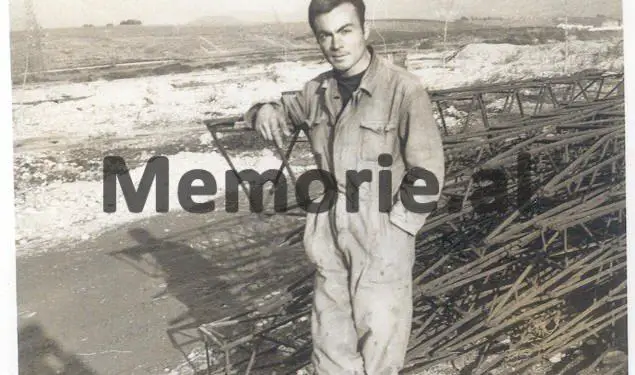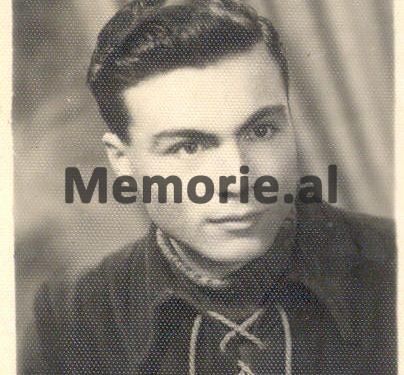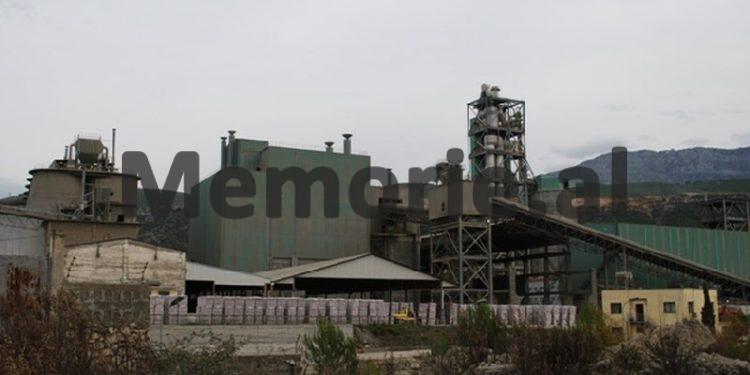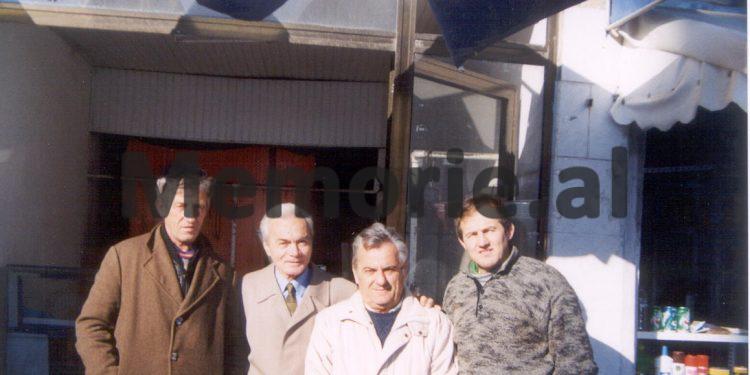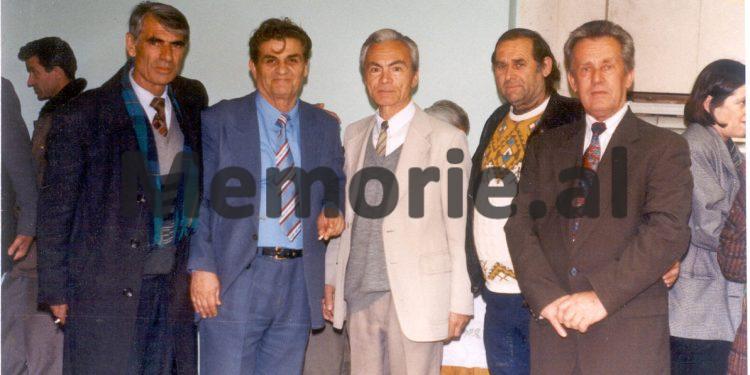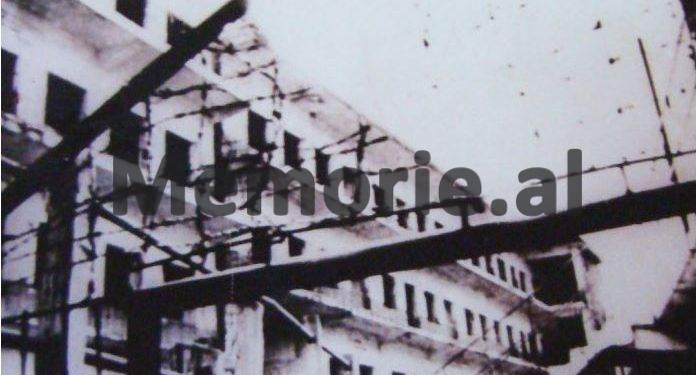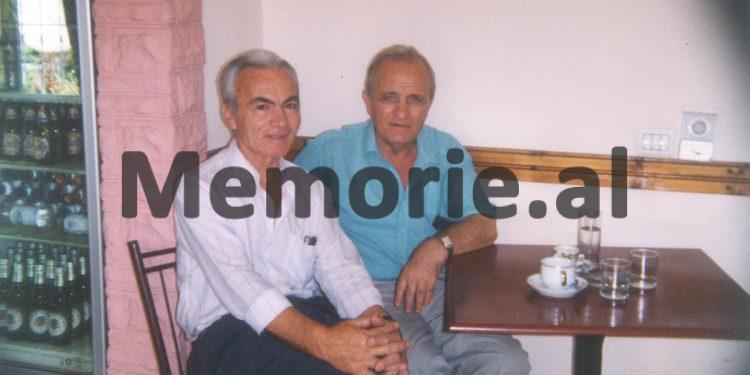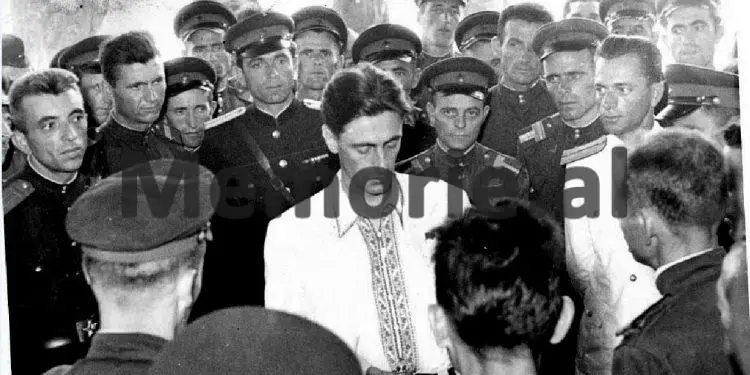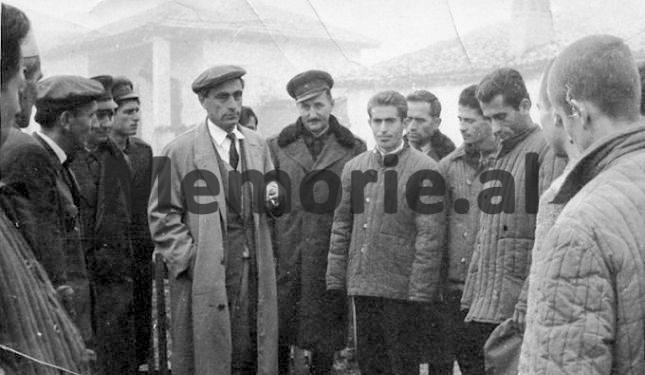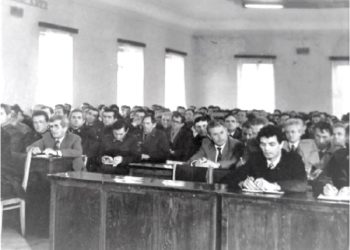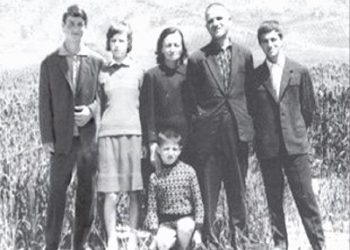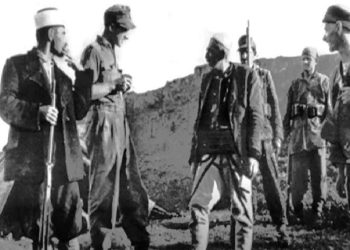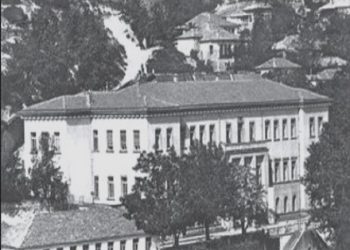Tanush Kaso
Memorie.al publishes some of the unknown stories that took place in the camps and prisons of the communist regime of Enver Hoxha, such as the camp of the Laç Superphosphate Plant in the early 1960s, the Cement Factory camp in Fushë Krujë, the camp of The Cement Factory in Elbasan, the Spaç camp, etc., where hundreds of convicts suffered their sentences, where some of them lost their lives in those camps, being killed by soldiers, by accidents, or by doing so. suicide from difficult living and working conditions. The rare testimony of writer and publicist Tanush Kaso, a former political prisoner who spent years in these camps and prisons, recounts some of the most painful events that happened to his accomplices as an attempt by four prisoners: Mark Cufi, Eqerem Zeko, Naun Kondakçiu, Qerim Çaushi, in the Laç camp with the commander, Colonel Azbi Lamçen, who were captured and killed by soldiers and police a few minutes after the escape. As well as the spectacular escape that took place in the camp of the Cement Factory in Fushë-Krujë, where the two convicts, Ylli Tabaku from Tirana and Maksut Xhomaka from Margëlliçi of Chameria, who after hijacking a vehicle with a reconnaissance inside the camp, left quickly broke the outer gate of that prison, but could not enjoy the freedom, as their vehicle crashed a few hundred meters and they ran to the hills, where they were caught by the numerous guards who followed them.
At the Lac Factory Camp
The camp of the Laç Superphosphate Plant, which housed about 700 political prisoners, was located within a large area surrounded by armed bodyguards and barbed wire, in the north of the small village called Laç, in the province of Kurbin, which at that time it was under the administration of the Kruja district. That plant, which would produce phosphate fertilizers for agriculture and sulfuric acid for industry, had begun to be built with the help of the Chinese. The Albanian government at the time had planned to build the plant with political prisoners, and after that decision, Camp Commander, Colonel Azbi Lamçja (originally from Mallakastra), accompanied by numerous guards, went to Burrel Prison on his own and after choosing about 200 prisoners, who were in good health and physical condition to work, were taken to the Laç camp. All those prisoners who came from Burrell Prison were arranged to sleep in a large building that would later serve as a warehouse for storing various building materials. The commander of that camp, Colonel Azbi Lamçja, also held that position for the Rubik and Fushë-Krujë camps. He was a very rich figure with various events from prisons and camps where he had served for many years. Azbiu himself had been a regular prisoner since the first years after the war, convicted of killing a girl by his tribe, and had been released under an amnesty granted after the fall of Koci Xoxa. Mehmet Shehu, with whom he had kinship ties, also assisted in his release, and at the same time that Mehmeti took over the functions of Koci Xoxa, he helped Azbi by taking him into the ranks of the Ministry of Internal Affairs with the duty of the commander in several camps and prisons. Azbi wanted to be nice to the prisoners (since he had tried the prison himself), but he did better than the others “the task of the Party”, fulfilling them as best he could and even surpassing the orders of his superiors. State Security. Even the Minister of Interior, Kadri Hazbiu, who had replaced Mehmet Shehu in that post, was close to him in terms of marriage. Given the bonds of friendship and marriage he had with two of the leading figures of the communist state, he had full powers, even for the early release of any convict. Azbi speculated a lot with the families of the convicts, taking from them various raisins, which he kept for himself, but also took to his superiors. Azbi Lamçe was fired and fired by the army, accusing him of theft and abuse of office. After that, he was taken to Tirana as a director in a water company, but he also stole there. After that, he was sentenced to prison and when he came out before the year was over, he started complaining and cursing. He was later convicted of “agitation and propaganda” and, after being released from prison, retired and later died. During the first year, the political prisoners who were in the Laç camp were involved in the construction of palaces, which are still today in that city located on the right side of the national road that leads to Shkodra, as well as a part of Vora-Laç railway route. Initially, the treatment of prisoners in the Laç camp was better than in other camps, as Chinese technicians and engineers worked there and there was a need for urgent and quality work. Prisoners freely chose their professions and trades, such as mason, carpenter, welder, mechanic, electrician, and even construction technician. From time to time, the camp allowed the screening of Albanian and Latin American films, such as “Heaven of Happiness,” and others that were liked and repeated. The food supply was done with a store opened especially inside the camp. Prisoners who earned little money from exceeding the norm, such as e.g. a pound of sugar or pasta. To our great surprise, the first year we were allowed to celebrate the New Year, staying up all night with conversations, humor, music, and movies. In the courtyard of the camp was placed the New Year’s tree, which was decorated with lights and cotton that imitated the snow, as was done in shop windows in cities. All this unusual thing was not done by the generosity of the commander, Azbi Lamçe, but because that is how the instructions came from Tirana.
The murder of Mark Cufi from Shkodra
On the eve of the 20th anniversary of the Liberation and Flag Day, the situation seemed somewhat softer and we hoped to give some “broad amnesty” on the occasion of those holidays. But this was not realized. From that day on, the disappointment began, and as a result, prisoners began to be mistreated by the camp command. Given the dire psychological situation we were in, many of the convicts thought about how to escape from there. One of them was a brave boy from Shkodra, Mark Cufi, who managed to escape, but was killed by police forces and the army, as he had arrived somewhere near the city of Shkodra. The enigmatic murder of Mark Cufi, who tried and escaped from the camp, greatly aggravated the situation. The official version of his murder was: “attempted escape.” His torn body, which later appeared to have been stitched up, was brought in by a car and thrown into the camp yard, where the New Year’s tree had previously been placed. After that, all of us prisoners gathered there and the Chairman of the Internal Branch of the Kruja district, Nuri Çakërri (originally from Vlora), gave a very harsh speech. Even today I remember those expressions of his, full of hatred, such as: “This is how you will all end! Do not forget that the Anglo-Americans will come to your rescue! Kalashnikov will work for us… ”On the same day, I can never forget the courage and bravery of Islam Cenko from Përmet, who appeared before all the prisoners of the Camp Command and kissed the lifeless Mark Cufi on the forehead, which he suffered for a month in solitary confinement.
Other killings in Lac
There in that camp, there were several other murders by communist bullets. I remember as now the murders of our convicted comrades such as Eqerem Zeko, Naun Kondakçiu, Qerim Çaushi, etc. Eqerem Zeko was killed by soldiers with automatic bursts as he was dumping garbage near the camp siege. While Naum Kondakçiu, my childhood friend, was killed somewhere not far from the camp (where today is the small bridge in front of the public cemetery of the city of Laç) after he escaped from the camp together with his two friends: Sazan Hadërin and Murat Tuesday. The three of them hijacked a “Zis” car working inside the camp and hit the main gate of the Plant with it and left. As Sazani and Murat were quickly captured by soldiers and stray dogs at the border, Naumi fled a little further and hid in some bushes near a small stream, where he was surrounded by soldiers and police. He did not have to be killed because he was surrounded on all sides and unarmed and could easily have been captured alive, but he was deliberately killed to terrorize the other prisoners. While Patriot Xhelo from the district of Vlora, in a moment of despair was thrown over the surrounding wires of the camp and was immediately shot with automatic volleys by the military guards. He fell to the ground a few meters after passing the wires, hit by many bullets in the body, but miraculously escaped death. He was hospitalized and after recovering, was re-convicted and later served his sentence and was released. Now he lives in good health, but of course old, together with his family who created him with a thousand troubles after his release from prison. While the young Qerim Çaushi ended his life by throwing his head from the terrace and the camp building, as he could not bear the sufferings that tormented him in that hellish prison. After these four killed, there were eight other deaths in that camp from work accidents and various diseases due to the very difficult conditions that camp had. There were many accidents at work that left lifelong invalids, such as Eqerem Çapaj from Vlora, who worked as an assembler. Eqerem fell from the Truss and his spine was damaged in one leg. Since then, he has remained crippled and almost paralyzed. In addition to Eqerem, many other convicts from that camp have been maimed.
In the camp of Fushë-Krujë
The site where the Cement Factory was to be built was a few kilometers away. east of Fushë-Krujë, at the foot of the mountains below the town of Krujë. Adjacent to the worksite, rectangular barracks were erected, some barracks with a courtyard in the middle, where there was also a small summer canteen with wooden benches, and a little further, the baths and some cells. All of these made up the camp where we were about 600-700 political and ordinary prisoners. Several partitions in one of the barracks were used for nursing, and at the gate was the cabin of the internal guards of the unarmed camp. The whole camp was surrounded by a barbed-wire fence and another even larger one was around the worksite. At a distance of several meters from each other, on several wooden piers stood the siege guards, armed with automatic weapons and light machine guns. The commander of that camp was initially Colonel Azbi Lamçe, but he was later replaced by Qemal Nallbani, who was originally from Vlora. While the camp commissioner was Besnik Çomo, originally from Mallakastra, who was known for his arrogance and rare savagery. After many years, for the needs of work, it was the first time that political prisoners and ordinary people joined that camp. Sleeping was done in separate silos, but the yard was shared and at work, there was no separation between us. We got along very well with each other and there was a lot of solidarity and understanding from both sides. Ordinary convicts respected us very much. When about 100 people from the Laç camp took us to the Fushë-Krujë camp for the worse, we felt more relieved, as thinking that there were ordinary convicts there, we remembered that there would be liberalism there. That factory, as well as the Laç Superphosphate Plant, was built with the help of the Chinese, whom we had close by during all the works we did, which were run by them. In the early hours we read, played chess and dominoes, or took the song, along with ordinary fellow sufferers, among whom he was very dissatisfied with Enver Hoxha’s policies and showed all sorts of banal jokes about him and his laurels. Among them were many talented instrumentalists and singers. When we were there, a newcomer came to us for political reasons, somewhat different from the others. He was a professional musician who had performed conservatory in Czechoslovakia. His name was Ali Hoxha and he was from Kamza in Tirana. He used the guitar and some wind instruments. He had brought with him a trumpet and a saxophone, bought in China, where he had been with the State Ensemble. His drama was simple. Returning to the Homeland while the plane was had stopped for a short break in Moscow, he hid and remained there. The Russians received him well. They promised him political asylum and work or, if he wished, he could go elsewhere. After ten days, thinking about the consequences that his relatives in Albania might have for his cause, he decided to return. “They will punish,” the Russians told him. “In ten days of feeling, you will do ten years in prison.” We know the laws of your country, they are like ours, of Stalin’s time… ”He insisted on returning to Albania. They launched it on a Chinese plane. As he descended on Rinas, he was accompanied by Security men. Investigations, isolation, espionage suspicions began, and then ten years in prison.
The escape of two prisoners in Fushë-Krujë
One of the most sensational events in the Fushë-Krujë Camp was the spectacular escape of Ylli Tabaku from Tirana and Maksut Xhomaka from Margëlliçi in Chameria. There were days when they stayed together and walked around the construction site, especially where brick and car construction materials were unloaded. They apparently studied and prepared the escape plan from hell. That thing was a bold undertaking that you could pay with your life. I had noticed that Ylli, as romantic as she was, sang a light music song from time to time in those days, which had not been out for a long time, with the refrain “Forget, always forget”. And one day, all of a sudden, while everyone was scattered on the front lines, a car with a trailer rushed at the big gate, which it tore apart and passed without difficulty. The guards were for a moment surprised and confused: then they fired long automatic machine-gun fire in the direction of the car, which appeared to be driverless after both prisoners had lowered their heads. Three hundred meters further, on the first turn, the car was battered, because the trailer had remained braked. The two boys then got out of the car and ran towards the hills. Meanwhile, a large number of soldiers, police, and civilians were pursued. The prisoners had left their jobs and climbed the scaffolding, watching the event unfold. From where we were, we saw that our comrades had gone beyond the hills, but not even three or four hours later, we noticed that a large number of people were descending from the tops of the hills. It was understood that they had been captured. And it could not be otherwise. When they approached, we saw that they had tied them with wire and continued to punch and kick them, walking along, accompanying them with insults and insults. They brought them inside the camp, where the work had already been stopped. There was a general outcry, and the two of them, Ylli and Babaushi (as they called Maxut), were tied up with wires behind the pillars and continued to be beaten and spat upon. The one who hit and blew more in their direction was the commissioner, Besnik Çomo, a disgusting cynic. The star fainted. They dragged him and put him in the dungeon. Babushi was still standing and cursing the captors, responding with the most ordinary insults. It had become like crazy. Then they took him to the dungeon. After a month he was brought to trial and re-sentenced, but what cannot be easily forgotten was the spirit of sacrifice shown to them by their comrades and especially the ordinary convicts who went secretly from the guards, even risking their lives and their lives. Food, vitamins, and cigarettes were put in the dungeons./Memorie.al
Follows tomorrow




